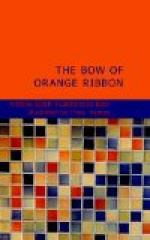“I know, Katharine, I know. Leave, then, with Bram, and go first to Margaret Pitt’s, and ask her if the new winter fashions will arrive from London this month. I heard also that Mary Blankaart has lost a silk purse, and in it five gold jacobus, and some half and quarter johannes. Ask kindly for her, and about the money; and so the morning could be passed. And look now, Katherine, peace is the best thing; and to his own house Batavius will go in a few weeks.”
“That will make me glad.”
“Whish, mijn kind! Thy bad thoughts should be dumb thoughts.”
“Mijn moeder, sad and troubled are thy looks. What is thy sorrow?”
“For thee my heart aches often,—mine and thy good father’s, too. Dost thou not suffer? Can thy mother be blind? Nothing hast thou eaten lately. Joanna says thou art restless all the night long. Thou art so changed then, that wert ever such a happy little one. Once thou did love me, Katrijntje.”
“Ach, mijn moeder, still I love thee!”
“But that English soldier?”
“Never can I cease to love him. See, now, the love I give him is his love. It never was thine. For him I brought it into the world. None of thy love have I given to him. Mijn moeder, thee I would not rob for the whole world; not I!”
“For all that, kleintje, hard is the mother’s lot. The dear children I nursed on my breast, they go here and they go there, with this strange one and that strange one. Last night, ere to our sleep we went, thy father read to me some words of the loving, motherlike Jacob. They are true words. Every good mother has said them, at the grave or at the bridal, ’En mij aangaande, als ik van kinderen beroofd ben, zoo ben ik beroofd!’”
There was a sad pathos in the homely old words as they dropped slowly from Lysbet’s lips,—a pathos that fitted perfectly the melancholy air of the fading garden, the melancholy light of the fading day, and the melancholy regret for a happy home gradually scattering far and wide. Many a year afterward Katharine remembered the hour and the words, especially in the gray glooms of late October evenings.
The next morning was one of perfect beauty, and Katharine awoke with a feeling of joyful expectation. She dressed beautifully her pale brown hair; and her intended visit to Mary Blankaart gave her an excuse for wearing her India silk,—the pretty dress Richard had seen her first in, the dress he had so often admired. Her appearance caused some remarks, which Madam Van Heemskirk replied to; and with much of her old gayety Katherine walked between her father and brother away from home.
She paid a very short visit to the mantua-maker, and then went to Mrs. Gordon’s. There was less effusion in that lady’s manner than at her last interview with Katherine. She had a little spasm of jealousy; she had some doubts about Katherine’s deserts; she wondered whether her nephew really adored the girl with the fervour he affected, or whether he had determined, at all sacrifices, to prevent her marriage with Neil Semple. Katherine had never before seen her so quiet and so cool; and a feeling of shame sprang up in the girl’s heart. “Perhaps she was going to do something not exactly proper in Mrs. Gordon’s eyes, and in advance that lady was making her sensible of her contempt.”




